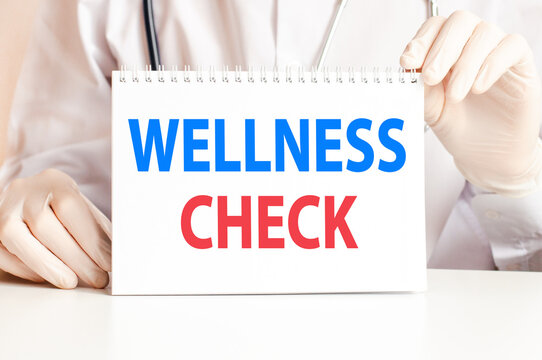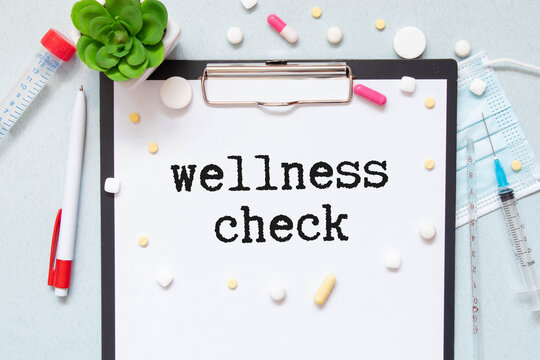What is a Wellness Check?
A wellness check, also known as a welfare check or a safety check, is a visit or contact made by authorities or concerned individuals to ensure the well-being and safety of a person. This often involves checking on individuals who may be vulnerable, such as elderly people living alone, individuals with disabilities, or those who are known to be going through challenging situations like illness or emotional distress.
The purpose of a wellness check is to make sure that the person is safe, in good health, and not in need of immediate assistance. Wellness checks can be initiated by family members, friends, neighbors, social services, healthcare professionals, or law enforcement agencies, depending on the circumstances and the level of concern for the individual’s welfare. Read about What is Mental Health
Importance of Wellness Checks
Regular wellness checks play a pivotal role in preventive healthcare strategies. They empower individuals to take charge of their health by providing insights into their current health status and identifying areas for improvement before they escalate into serious health issues.
Benefits of Regular Health Check-ups
Wellness checks offer numerous benefits, including early detection of health problems, timely interventions, and personalized health management plans. By undergoing regular check-ups, individuals can minimize the risk of developing chronic diseases and enhance their quality of life. Discover about What is Commonly Misdiagnosed as Pink Eye

Preventive Healthcare Measures
Wellness checks enable healthcare providers to recommend preventive measures such as vaccinations, lifestyle modifications, and screenings for conditions like diabetes, hypertension, and cancer. These proactive interventions help in averting potential health crises and promoting longevity.
Components of a Wellness Check
A comprehensive wellness check typically comprises several key components aimed at evaluating different aspects of an individual’s health.
Physical Examination
A thorough physical examination involves assessing vital signs, examining body systems, and identifying any physical abnormalities or signs of illness. It provides valuable insights into an individual’s overall health and helps in detecting early warning signs of diseases. Learn about Understanding What are the 4 Stages of COPD
Medical History Review
Reviewing a patient’s medical history is crucial for understanding their past health issues, family medical history, and lifestyle factors that may influence their current health status. This information assists healthcare providers in tailoring preventive measures and interventions to suit the individual’s needs.
Laboratory Tests
Laboratory tests, including blood tests, urine analysis, and imaging studies, help in assessing various physiological parameters such as cholesterol levels, blood sugar levels, and organ function. These tests provide objective data that aid in diagnosing underlying health conditions and monitoring treatment effectiveness.
Screening Tests
Screening tests are designed to detect specific health conditions or risk factors in asymptomatic individuals. Examples include mammograms for breast cancer, colonoscopies for colorectal cancer, and Pap smears for cervical cancer. These screenings are essential for early detection and intervention, improving treatment outcomes and prognosis.
Frequency of Wellness Checks
The frequency of wellness checks may vary depending on factors such as age, gender, medical history, and risk factors for certain diseases.
Recommendations for Different Age Groups
Children and adolescents may require annual wellness checks to monitor growth and development, administer vaccinations, and address any emerging health concerns. Adults should undergo periodic check-ups as recommended by their healthcare providers, typically ranging from yearly to biennial visits. Older adults and individuals with chronic conditions may benefit from more frequent monitoring and specialized screenings. Learn about Does Coffee Help Hangovers
Special Considerations
Certain populations, such as pregnant women, individuals with a family history of hereditary diseases, and those with specific occupational or lifestyle risks, may require tailored wellness programs and more frequent assessments to mitigate potential health risks effectively.
Preparing for a Wellness Check
Preparing for a wellness check involves proactive steps to ensure a productive and informative consultation with your healthcare provider.
Tips for Preparation
- Compile Relevant Information: Gather information about your medical history, including past illnesses, surgeries, medications, and family medical history.
- Make a List of Concerns: Identify any symptoms, changes in health, or questions you have for your healthcare provider.
- Bring Necessary Documentation: Bring along your insurance card, identification, and any relevant medical records or test results.

Questions to Ask Your Healthcare Provider
- What screenings or tests are recommended for my age and health status?
- Are there any lifestyle modifications I should consider to improve my health?
- How can I better manage my chronic conditions or risk factors?
- Are there any preventive measures or vaccinations I should consider?
What to Expect During a Wellness Check
During a wellness check, individuals can expect a series of assessments, screenings, and discussions with their healthcare provider aimed at evaluating various aspects of their health.
Typical Procedures and Tests
- Physical Examination: Assessment of vital signs, body systems, and overall physical health.
- Medical History Review: Discussion of past medical issues, family history, and lifestyle factors.
- Laboratory Tests: Blood work, urine analysis, and other diagnostic tests to evaluate specific health parameters.
- Screening Tests: Recommended screenings based on age, gender, and risk factors for diseases such as cancer, diabetes, and cardiovascular disorders.
Communication with Healthcare Providers
Open and honest communication with healthcare providers is essential during wellness checks. Patients should feel comfortable discussing their health concerns, asking questions, and seeking clarification about recommended treatments or preventive measures.
Interpreting Wellness Check Results
Understanding and interpreting wellness check results is crucial for making informed decisions about one’s health and well-being.
Understanding Test Reports
Healthcare providers will review test results with patients, explaining any abnormalities or areas of concern. Patients should actively participate in discussions about their health status, treatment options, and follow-up care plans.
Identifying Red Flags
Patients should be vigilant about signs and symptoms that may indicate underlying health issues, such as persistent pain, unusual fatigue, changes in appetite or weight, and unusual lumps or bumps. Prompt reporting of such symptoms to healthcare providers enables early intervention and timely treatment.
Wellness Checks and Disease Prevention
Wellness checks play a pivotal role in disease prevention by facilitating early detection and intervention strategies.
Early Detection of Health Issues
Regular wellness checks increase the likelihood of detecting health issues in their early stages when they are most treatable. Early intervention can prevent the progression of diseases and improve treatment outcomes.
Lifestyle Modifications
Wellness checks provide an opportunity for healthcare providers to counsel patients on adopting healthy lifestyle habits, including regular exercise, balanced nutrition, stress management techniques, and adequate sleep. These lifestyle modifications reduce the risk of developing chronic diseases and promote overall well-being.
Challenges and Misconceptions Surrounding Wellness Checks
Despite their importance, wellness checks face several challenges and misconceptions that may hinder their widespread adoption and effectiveness.
Barriers to Access
Factors such as lack of insurance coverage, financial constraints, geographical barriers, and limited healthcare resources may prevent individuals from accessing regular wellness checks. Addressing these barriers requires collaborative efforts from policymakers, healthcare providers, and communities to ensure equitable access to preventive healthcare services.
Cultural and Societal Factors
Cultural beliefs, stigmas surrounding health screenings, and fear of medical procedures may deter individuals from seeking timely healthcare interventions. Educating communities, promoting cultural sensitivity, and fostering trust between patients and healthcare providers are essential for overcoming these barriers.
Importance of Mental Health in Wellness Checks
In addition to physical health assessments, wellness checks should encompass evaluations of mental health and emotional well-being.
Incorporating Mental Health Assessments
Routine mental health screenings help in identifying conditions such as depression, anxiety, and stress disorders that may impact an individual’s overall well-being. Integrating mental health assessments into wellness checks promotes holistic health management and reduces the stigma associated with mental illness.
Holistic Well-being Approach
Wellness checks should adopt a holistic approach that addresses the interconnectedness of physical, mental, and emotional health. Comprehensive assessments and interventions that encompass all dimensions of well-being contribute to optimal health outcomes and improved quality of life.
Technology and Innovation in Wellness Checks
Advancements in technology have transformed the landscape of wellness checks, offering new opportunities for accessible and personalized healthcare services.
Telemedicine and Virtual Consultations
Telemedicine platforms and virtual consultations enable individuals to access healthcare services remotely, eliminating geographical barriers and enhancing convenience. Virtual wellness checks allow patients to consult with healthcare providers from the comfort of their homes, promoting continuity of care and proactive health management.
Wearable Health Devices
Wearable health devices such as fitness trackers, smartwatches, and mobile health apps empower individuals to monitor their health metrics, track fitness goals, and receive real-time health insights. These devices complement traditional wellness checks by providing continuous monitoring and personalized health recommendations.
The Role of Healthcare Providers in Wellness Checks
Healthcare providers play a pivotal role in facilitating meaningful wellness checks and fostering collaborative partnerships with patients.
Patient Education and Empowerment
Healthcare providers should prioritize patient education, empowering individuals to make informed decisions about their health and well-being. Educating patients about the importance of wellness checks, preventive measures, and healthy lifestyle habits promotes active participation in their healthcare journey.
Establishing Trustful Relationships
Building trustful relationships between healthcare providers and patients is essential for effective communication, shared decision-making, and continuity of care. Patients should feel respected, heard, and supported throughout the wellness check process, fostering a collaborative healthcare environment.

Cost and Insurance Coverage for Wellness Checks
Access to affordable wellness checks is essential for promoting equitable healthcare access and reducing disparities in health outcomes.
Affordable Care Act Provisions
The Affordable Care Act (ACA) mandates coverage for preventive services, including wellness checks, without cost-sharing requirements for eligible individuals with private health insurance plans. This provision ensures that preventive healthcare services are accessible to a broader segment of the population, regardless of financial constraints.
Private Insurance Coverage
Private insurance plans may offer coverage for wellness checks and preventive services, albeit with varying cost-sharing arrangements and coverage limitations. Individuals should review their insurance policies to understand the extent of coverage for wellness checks and any out-of-pocket expenses they may incur.
Conclusion
In conclusion, wellness checks are integral to maintaining optimal health and well-being by facilitating early detection, preventive interventions, and holistic health management. By prioritizing regular check-ups, individuals can take proactive steps towards safeguarding their health, reducing the burden of disease, and enhancing their overall quality of life.
FAQs
- What age should I start getting wellness checks?
- Wellness checks should commence early in life, with pediatricians conducting routine check-ups for infants and children. Adults should undergo periodic wellness checks as recommended by their healthcare providers, typically starting in their twenties or thirties.
- Are wellness checks covered by insurance?
- Many insurance plans, including those under the Affordable Care Act (ACA), offer coverage for preventive services, including wellness checks, without cost-sharing requirements. However, coverage provisions may vary depending on the insurance plan and individual policy terms.
- How often should I have a wellness check?
- The frequency of wellness checks depends on factors such as age, gender, medical history, and risk factors for certain diseases. Healthcare providers typically recommend annual or biennial check-ups for adults, with additional screenings and assessments for high-risk populations.
- Can wellness checks detect mental health issues?
- Yes, wellness checks encompass assessments of mental health and emotional well-being, enabling healthcare providers to identify symptoms of depression, anxiety, and other mental health conditions. Integrating mental health screenings into wellness checks promotes early detection and intervention for improved outcomes.
- What should I do if my wellness check results are abnormal?
- If wellness check results indicate abnormalities or potential health concerns, it is essential to follow up with your healthcare provider for further evaluation and guidance. Your provider may recommend additional tests, referrals to specialists, or interventions to address the identified health issues.




